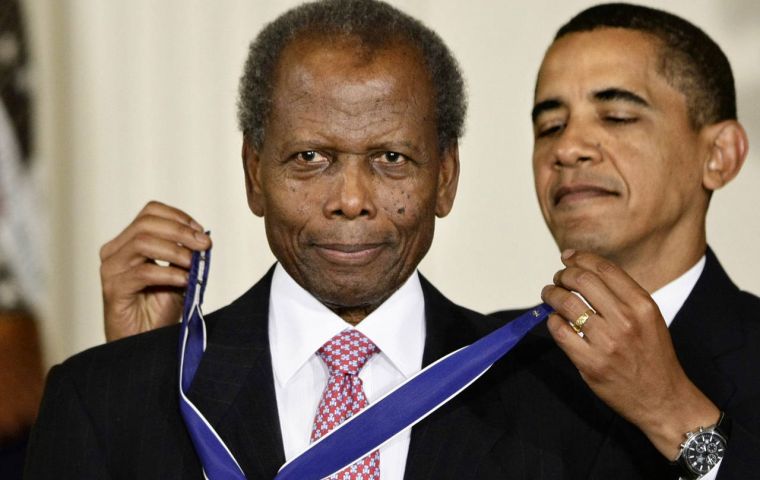MercoPress. South Atlantic News Agency
Actor, director, diplomat Sidney Poitier dies aged 94
 In 2009 President Barack Obama awarded him the Presidential Medal of Freedom
In 2009 President Barack Obama awarded him the Presidential Medal of Freedom Oscar-winning actor Sidney Poitier, KBE, has died at the age of 94, Bahamas' highest authorities have announced. He had been knighted in 1974.
Bahamas Prime Minister Philip Davis also held a press conference in remembrance of the film icon as an “actor and film director, an entrepreneur, civil and human rights activist and, latterly, a diplomat.”
“We admire the man not just because of his colossal achievements but also because of who he was: his strength of character, his willingness to stand up and be counted, and the way he plotted and navigated his life’s journey,” Davis said, as he instructed the Bahamian flag be flown at half-mast ”at home and in our embassies around the world.
Although born in Miami on Feb. 20, 1927, his entire family lived in the Bahamas, by then still a Crown Colony. Hence, Poitier held both nationalities.
In 1964, he was the first African American and first Bahamian to win the Academy Award for Best Actor. He also received two competitive Golden Globe Awards, a competitive British Academy of Film and Television Arts (BAFTA), and a Grammy Award for Best Spoken Word Album.
“We know the world mourns with us. Sidney’s light will continue to shine brightly at generations to come,” Davis added.
Poitier's father, a tomato farmer, moved his family to Nassau when Sidney was 11. At age 15 he moved to Miami and, at age 16, to New York, where he found work as a dishwasher and eventually became a janitor for the American Negro Theater in exchange for acting lessons.
It was there where Poitier was given the role of understudying Harry Belafonte in “Days of our Youth.” Poitier made his public debut while filling in one night. Afterward, he earned a small role in the Greek comedy “Lysistrata.” Poitier continued to perform in plays until 1950 when he made his film debut in “No Way Out.”
Poitier is celebrated as a groundbreaking actor and enduring inspiration who transformed how Black people were portrayed on the big screen. Before Poitier, no Black actor had a sustained career as a lead performer and few Black actors were permitted a break from the stereotypes of bug-eyed servants and grinning entertainers. “I made films when the only other Black on the lot was the shoeshine boy,” Poitier recalled in a 1988 Newsweek interview.
Poitier peaked in 1967 with three of the year’s most notable movies: To Sir, With Love, in which he starred as a school teacher who wins over his unruly students at a London secondary school; In the Heat of the Night, as the determined police detective Virgil Tibbs; and in Guess Who’s Coming to Dinner, as the prominent doctor who wishes to marry a young white woman he only recently met, her parents played by Spencer Tracy and Katharine Hepburn in their final film together.
Theater owners named Poitier the No. 1 star of 1967, the first time a Black actor topped the list. In 2009 President Barack Obama, whose own steady bearing was sometimes compared to Poitier’s, awarded him the Presidential Medal of Freedom, saying that the actor “not only entertained but enlightened ... revealing the power of the silver screen to bring us closer together.”
“All those who see unworthiness when they look at me and are given thereby to denying me value — to you I say, ‘I’m not talking about being as good as you. I hereby declare myself better than you,’” he wrote in his memoir, “The Measure of a Man,” published in 2000.
His screen career faded in the late 1960s as political movements became more radical. He acted less often and began directing, his credits including the Richard Pryor-Gene Wilder farce Stir Crazy, Buck and the Preacher (co-starring Poitier and Belafonte) and the Bill Cosby comedies Uptown Saturday Night and Let’s Do It Again.
In the 1980s and ’90s, he appeared in the feature films Sneakers and The Jackal and several television movies, receiving an Emmy and Golden Globe nomination as future Supreme Court Justice Thurgood Marshall in Separate But Equal and an Emmy nomination for his portrayal of Nelson Mandela in Mandela and De Klerk.
The only Black actor before Poitier to win a competitive Oscar was Hattie McDaniel, the 1939 best supporting actress for Gone With the Wind.




Top Comments
Disclaimer & comment rulesCommenting for this story is now closed.
If you have a Facebook account, become a fan and comment on our Facebook Page!